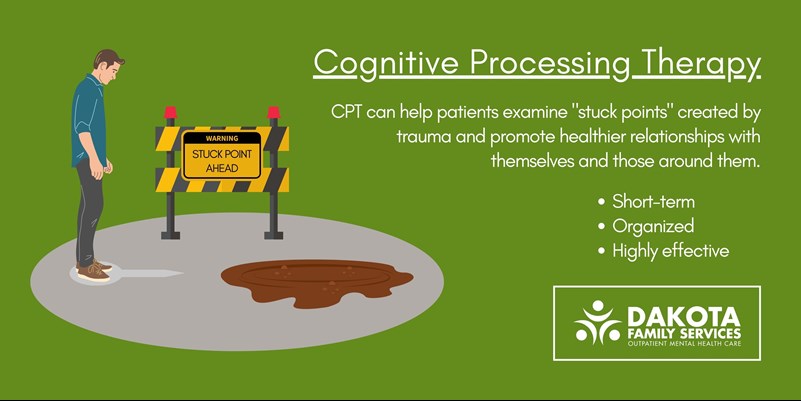Cognitive Processing Therapy (CPT)
Definition
Cognitive Processing Therapy (CPT) is an effective treatment for trauma related disorders and reactions for adolescents (approximately 14 and older) and adults. CPT focuses on looking at how your trauma has changed your thoughts about yourself, others, and the world around you. The belief is these thoughts, or “stuck points,” create trauma reactions and distress by distorting how you understand what is happening around you. Examining these stuck points in detail with your therapist can help you change your relationships with yourself, others, and the world to be more reflective of effective and helpful ways of living in the world.
Key Things to Know About CPT
- CPT is a relatively short-term therapy. Generally, CPT is set up to be approximately 12 sessions long (but can be somewhat shorter or longer with a range of 8-16 weeks). Your therapist might ask you to engage in CPT twice per week.
- CPT has been shown to be extremely effective in years of research at the VA and elsewhere. It does not matter if you have experienced one trauma or many. Many people no longer qualify for a diagnosis of PTSD at the end of treatment. Meaning symptoms have reduced and no longer meet the criteria for a diagnosis.
- There is a fun CPT app to use along with CPT that helps you complete homework, track sessions and stuck points, and keep everything in one handy location on your phone.
- CPT is difficult and a lot of work. Trauma treatment is often regarded as the most difficult type of treatment you can do, but it is very worth the short-term difficulties for long term freedom from PTSD.
- CPT is a treatment with many worksheets, so if you are the kind of person who likes things to be sequential, organized, and written down, CPT might be the trauma treatment for you.


